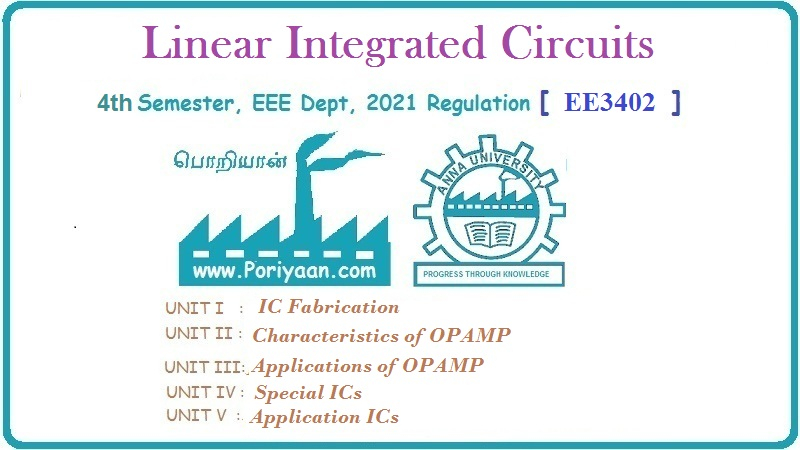Linear Integrated Circuits: Unit I: IC Fabrication
Fabrication of PV Cell
A PV cell means photovoltaic cell or solar cell which works on photovoltaic effect. It generates voltage proportional to the light incident on it.
Fabrication of PV Cell
A
PV cell means photovoltaic cell or solar cell which works on photovoltaic
effect. It generates voltage proportional to the light incident on it.
The
Fig. 1.16.1 (a) shows the construction of a photovoltaic cell while the Fig.
4.5.1 (b) shows the symbl of a photovoltaic cell.

The
surface layer of p-type material is extremely thin so that light can penetrate
to the junction. The nickel plated ring around p-type is the positive output
terminal. The nickel plated ring around n-type material acts as the negative
output terminal.
When
the light strikes the cell, the photon light energy is absorbed by the
semiconductor material and number of electron-hole pairs are generated. This
happens on both the sides of the junction.
The
holes are directed towards the p-region while the electrons are directed
towards the n-region due to the electric field present. Due to this movement
the minority current is set up across the junction due to which the voltage is
developed across the p and n regions. This voltage is taken out as the output
voltage.
Most
practical photovoltaic cells use silicon as it is easily available and cheap
compared to other materials.
1. Steps of Fabrication of PV Cell
The
various steps of fabrication of PV cell are,
Refining
silicon : The available mineral in earth is silicon dioxide
(SiO2). This is used to obtain silicon by removing oxygen. For this,
it is heated to 1500 - 2000 °C in an electrode arc furnace with coal and
charcoal i.e., reaction with carbon. The silicon obtained is 98 % pure which
contains the impurities like iron, aluminium etc. To remove these impurities,
further purification is necessary. For this purpose, powdered silicon is
reacted with anhydrous HC1 to obtain SiHCl3. Along with the halides
of iron and aluminium (FeCl3, AlCl3). The S1HCI3 is
reacted finally with hydrogen at 1100 °C to produce pure silicon.
Once
the pure silicon is available than various methods can be used for the fabrication
of PV cell.
a.
Screen Printed PV Cell Fabrication
This
is the simplest process of fabrication of a PV cell.
The
first step in this process is to obtain silicon wafer of 10 × 10 sq.cm and 0.5
mm thick. It is then p-type doped so as to obtain p-type wafer.
The
wafer is then heated in a furnace at 800 - 1000 °C with a phosphorous. This
causes small amounts of phosphorous to be deposited on the outer layers of
silicon. The phosphorous is required below the screen printed contact to
maintain low contact resistance.
The
wafers cut are then textured by etching pyramids on the wafer surface with a
chemical solution. The texturing ensures better light travel inside the wafer
by reducing reflection.
The
cells are stacked one on top of the other for the removal of the junction at
the edge of the wafer. The edges of the cells are etched by a highly reactive
plasma gas to remove the junction.
Then
the wafer is placed upside down and a screen is lowered onto the rear of the
cell along with the metal paste. A full aluminium layer printed on the rear on
the cell, with subsequent alloying through firing, produces back surface field.
This
is done by placing the cell in a second furnace at a very high temperature.
This firing process destroys the rear n-layer so that the aluminium makes
contact with the p-type bulk.
The
second print of aluminium is required for solderable contact.
The
cell is then flipped over for the printing on the front. The front contact is
printed in a similar manner as the rear contact.
The
finished cell is ready for encapsulation into a module. An extra metal contact
strip is soldered to the busbar during the encapsulation to lower the cell
series resistance. The square shape of a multi crystalline substrate simplifies
the packing of cells into a module.
Review Question
1. Explain the fabrication of a PV cell.
Linear Integrated Circuits: Unit I: IC Fabrication : Tag: : - Fabrication of PV Cell
Related Topics
Related Subjects
Linear Integrated Circuits
EE3402 Lic Operational Amplifiers 4th Semester EEE Dept | 2021 Regulation | 4th Semester EEE Dept 2021 Regulation
